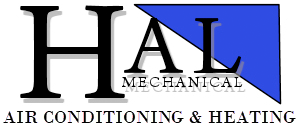Can a residential HVAC system be installed on a commercial building? Or can a commercial HVAC system be installed on a home for maximum efficiency? Does a commercial HVAC system need more or does it have the same needs as a residential HVAC system? These are some of the questions asked about commercial HVAC systems and residential HVAC systems. When it comes to installation or overall care, there is a major difference between the commercial and residential HVAC systems. Hal Mechanical would like to break down the major differences to ensure proper care and maintenance.
Power Requirements of Commercial VS Residential HVAC
A commercial HVAC system requires both space and power; and lots of it. When comparing a commercial HVAC system to a residential HVAC system, the power needs are greatly different. As the individual size of the air conditioner unit may seem the same, often a commercial building will use more space and power. Additionally, a commercial HVAC system will produce more conditioned air and will therefore demand more power to run a commercial unit. A commercial HVAC system will also run much more often as they typically are cooling and heating larger spaces. In short, a commercial HVAC system will need much more power to run a single unit than a residential HVAC system. Most homes do not have the needed power requirements.
Location & Placement of HVAC Units
When it comes to installation and placement of a commercial HVAC system, they are most commonly located on the building’s roof. However, commercial HVAC systems can also be installed on the ground. Nonetheless, most are roof top due to the amount of space they require. Both commercial and residential HVAC systems will be split into two parts: the condenser is on the ground or roof top, while the air handler is located inside the home and typically the attic. Commercial buildings, in most cases, will put the condenser on the roof not only because of the space requirement but it also helps prevent vandalism, damage, and better efficiency.
Mechanical Complexity of Building HVAC System
When breaking down a commercial HVAC system versus a residential HVAC system, they vary greatly in mechanical complexity. A residential HVAC system is less complex, having only eight major components that require maintenance. A commercial HVAC system has more components, especially in a multi-floored building that has more cooling or heating zones. A commercial HVAC system also requires a much more advanced exhaust system because of the different elevations. The drainage system is also much different between a commercial and residential drainage system. A residential drainage system consists of the condensate pan and the drain. A commercial is the same way but the drainage systems are much more involved as the drainage piping connects and splits off to each air conditioner. As there is more to a commercial HVAC system than a residential, the maintenance needs are also different as commercial HVAC systems tend to be much more complex.
HVAC Services & More in Aliante, Anthem, Desert Shores, Eldorado, Enterprise, Green Valley Ranch, Henderson, Inspirada, Mountain’s Edge, North LV, Peccole Ranch, Paradise, Providence, Rhodes Ranch, Seven Hills, Silverado Ranch, Spring Valley, Summerlin, Sunrise Manor, The Lakes, Tuscany Village & Las Vegas Nevada
It is important that an HVAC service is certified to work on both commercial and residential HVAC systems and that, as the owner, you provide the proper maintenance. For quality HVAC services, contact Hal Mechanical today.






